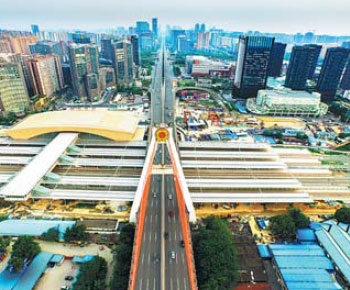Innovation, entrepreneurship bring success to Chengdu
Chengdu has already gained fame through its distinctive cuisine and breathtaking resorts. However, the hometown of kung pao chicken and hot pot is not satisfied being labeled as a travel destination.
The ambitious capital of Sichuan is chasing another label: innovative.
Several significant events have taken place in Chengdu to help it to become a city of creativity, high technology and entrepreneurship.
Earlier this September, Chengdu hosted the second Global Overseas Chinese Innovation and Entrepreneurship Competition in which the Sichuan-born scholar Wang Tao, with a doctorate from the University of Cambridge in chemical and biological engineering, won third prize.
Born in Pengzhou, a city next to Chengdu, Wang - the president of three healthcare technology companies - said: "Pengzhou can make good use of Chengdu's technology and talent resources. I can find the right people for my businesses at Chengdu's universities."
Beyond the competition, one of the most eye-catching events in the city is the 2016 Chengdu Global Innovation and Entrepreneurship Fair, aiming to gather resources and achievements from all around the world. The fair finished with an astonishing 3,000 deals being made, worth 16 billion yuan ($2.4 billion).
"Chengdu has huge potential and is very attractive for researchers and entrepreneurs," said Arthur B. McDonald, Nobel laureate for physics in 2015.
Chengdu's leap in technology and innovation could not be achieved without the full support from local government. This July, Chengdu has passed a series of new policies to benefit local talent and boost innovation.
According to the new policies, around 100 elites spanning from high-tech to finance, modern agricultural industries and education will receive up to 300,000 yuan of financial support for each and three years' training. It will also give out up to 200,000 yuan in support to each of the promising students for their projects each year.
"My research would have been a lot more difficult with out the help of the local government," said Wang Tun, founder of the Institute of Care-Life in Chengdu, who has been offered 250 square meters of office in high-tech zone at almost no cost to him.
"The success of the system can be attributed not only to me and my colleagues, but also to the policies that support personnel conducting innovative startup work in Chengdu."
The local government believes that innovation relies on technology but also investment.
Chengdu is gradually optimizing a financial service system to help companies to find investors.
liyu@chinadaily.com.cn
|
The Chengdu logo of the sunbird is displayed in the central area of the expressway. The city selected the sunbird as the logo because a sunbird gold foil was unearthed in 2001 in Jinsha Ruins dating back to 3,000 years. |
(China Daily 09/28/2016 page26)















